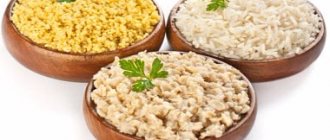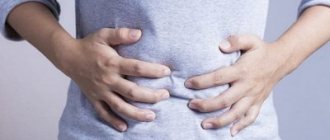Irritable bowel syndrome is a common disease that manifests itself in the form of various discomfort, possibly pain, in the pelvic area. This disease is common, and for many it has become something commonplace.
Many do not seek the help of specialists, considering this disorder not so serious. But, nevertheless, discomfort and pain are only a few of the consequences of IBS (irritable bowel syndrome), therefore, after diagnosis and confirmation of the problem, treatment should be started immediately.
Signs of Irritable Bowel Syndrome
Irritable bowel syndrome causes pain in the abdominal area.
Signs of IBS can be hidden behind other diseases, so diagnosing this disorder is somewhat complicated.
In order to independently diagnose the presence of this particular syndrome, and not any other diseases, you need to pay attention to some characteristic signs:
- Abdominal pain of unknown origin. The stomach begins to hurt suddenly and unexpectedly, without any prerequisites for this.
- It is difficult to determine the specific location of pain. The pain seems to be somewhere inside, affecting the entire cavity, but it is very difficult to determine its specific location. As a rule, the pain is aching, dull, less often – sharp and stabbing.
- Spasms. Very frequent spasms, the occurrence of which can be correlated with the time of psychological experiences and worries.
- Bloating. It usually precedes all of the above features. Bloating can also occur on its own.
- Belching, gas formation in the intestines. This symptom may indicate not only irritable bowel syndrome, but also other gastroenterological diseases. But with other signs of the syndrome, we can certainly note that belching and gas formation occur due to IBS.
- Constipation or diarrhea. These two extremes often alternate and most likely indicate problems with the intestines. At the same time, this symptom can also cause the manifestation of other symptoms, for example, spasms and pain.
If at least a few signs occur repeatedly, it is necessary to consult a doctor for a more accurate diagnosis, but if most of the pronounced symptoms are present, we can say that IBS is occurring.
Three main types of IBS
Based on the main symptoms and characteristics of the disease, 3 main forms of irritable bowel syndrome can be distinguished:
- For constipation with hard stool in the form of lumps - more than 25%, loose stool - less than 20%.
- With diarrhea, cloudy, liquid stools are observed.
- A mixed type of irritable bowel syndrome, in which hard stool is replaced by liquid, all occurs in fits.
Moreover, there is also such a classification as an indeterminate option, in which there is not enough data to classify it as one of the types.
In all types, the patient experiences unpleasant, uncomfortable sensations during defecation, and flatulence is observed.
While irritable bowel syndrome is the result of the interaction of various biological and psychological factors: movement disorders, hypersensitivity of the mucous membrane, dysfunction of the central nervous system, etc.
What can cause irritable bowel syndrome?
Poor diet can cause irritable bowel syndrome.
Doctors identify several main causes of this disorder.
These reasons can be both interrelated and independent; they can be divided into biophysical and psycho-emotional. Biophysical include:
- Lifestyle. In many ways, it determines the functioning of the most important organs in the body. If a person leads an active lifestyle and plays sports, then the organs are maintained in constant tone.
- Nutrition. Consumption of large amounts of fats and heavy foods leads to systematic disturbances in the functioning of the digestive system.
- Other diseases that affect the functioning of the intestine and its functions. Such diseases include dysbiosis, intestinal infections, poisoning, etc.
- Hereditary characteristics of the body.
Psycho-emotional factors in the development and occurrence of IBS include the following:
“Useful tips” in the fight against irritable bowel: changing your lifestyle
The basis of help is proper diet
Selecting a diet requires an individual approach, but there are several general recommendations.
It is important to remember the correct diet: it is best to eat small meals 4-5 times a day. Intervals of 3-4 hours between meals will help complete the digestion process. It is recommended to eat at the same time, in a calm environment, without haste.
Fatty, spicy, fried foods, chocolate, alcohol, coffee should be excluded from the diet if possible. It is also worth limiting the consumption of foods that cause increased gas formation: cabbage, radishes, beans, carbonated drinks, wheat, dairy products, onions, garlic. They lead to bloating, which means abdominal pain.
When compiling a diet, you need to take into account the nature of your stool. For example, for constipation, it is recommended to eat more dishes made from buckwheat and millet, and drink enough water2. If you are predisposed to celiac disease, you must follow a gluten-free diet3.
Drawing up an individual diet
A food diary is an indispensable assistant in creating an individual diet. On the pages of your diary you can note what foods you consumed and what your body’s reaction was to each of them. Constant attention to these details will help identify and eliminate those that cause intestinal upset. This way you can create a diet that is optimally suited to your body. This study may take two to four weeks, but the results are worth it.
Lifestyle with irritable bowel
Work-life balance is a healthy lifestyle again. Short 5-minute breaks have a positive effect on the condition of the body, including the intestines. In addition, your brain also needs rest and regular reboots. Try to alternate mental work with simple exercises: during a break, get up and walk around, roll from toe to heel, and bend over.
Sleep is an important component of human health. The fast pace of life and emotional experiences affect the quality of sleep. The consequences of this manifest themselves in the form of fatigue, increased irritability, headaches and decreased concentration. Stopping physical and mental activity 1-2 hours before bedtime will help the body relax and recover better.
Life without bad habits
Alcohol and tobacco have a negative impact on the health of the entire body. It is especially important to remember the influence of substances in their composition for people with irritable bowels. Alcohol has an irritating effect on the mucous membrane of the gastrointestinal tract (gastrointestinal tract). In addition, alcohol and nicotine are toxins for the nervous system, they disrupt its functioning and aggravate the initially impaired intestinal function. Therefore, giving up bad habits is a prerequisite for restoring intestinal function. Without its implementation, even if an improvement occurs, it will be temporary.
Regular physical activity
Physical activity helps cope with depression, stress and relieve emotional stress. At the same time, it is not at all necessary to strive for heavy loads. Yoga, swimming, running, walking can be an excellent option. Walking from work to home or vice versa is an excellent opportunity to distract the body from a sedentary lifestyle and speed up metabolism. In addition, walking is a natural form of exercise for the body, which will be pleasant and useful in the fresh air.
Methods for achieving emotional balance
To improve the emotional state of irritable bowel, it is important to control the emotional background and not succumb to stress. It has been proven that the work of the intestines, in particular the contraction of its walls, is regulated by the nervous system4. A failure in this chain leads to spasms and delayed evacuation of gases and intestinal contents.
If you cannot avoid stress, you can take sedatives as prescribed by your doctor. Herbal remedies have a mild relaxing effect. With regular use they can relieve anxiety and calm the nerves.
At more serious stages of emotional stress, consultations with a psychologist or psychotherapist and psychotherapeutic interventions may be required5. Experts will suggest techniques for dealing with stress and help you get rid of anxiety.
The tips listed are very helpful for signs of irritable bowel. Compliance with them can mean a complete change in your usual lifestyle, and this is sometimes difficult. It is important to be patient, persistent and determined.
Treatment of irritable bowel syndrome using traditional recipes
For a safe and effective lasting result in the treatment of IBS, herbal medicine and many traditional recipes are used. They have a number of advantages over drug treatment, which is sometimes impossible to use:
- A safer method if all proportions, duration of treatment and method of application are observed;
- If you are intolerant to some components of special drugs, traditional recipes remain the only way out;
- Side effects from this treatment are very rare;
- It is an inexpensive method of treatment compared to medication;
- It has not only a therapeutic effect, but also a restorative and preventive effect.
Folk recipes
Chamomile tea is very beneficial for the digestive tract.
Traditional recipes are often symptomatic in nature, so in order to comprehensively combat the problem they must be combined and combined.
Below are ways to get rid of specific occurrences of IBS. For bloating and gas formation in irritable bowel syndrome.
Dill. An old folk recipe, which is still used by many mothers to treat colic in newborns. The recipe is to prepare an infusion of dill seeds.
- Dill seeds – 35 g;
- Hot water – 600-700 ml.
The infusion is very simple - pour the seeds with hot water and infuse for several hours. Afterwards, you need to strain the infusion through cheesecloth to get rid of any remaining seeds. Take 2-3 times a day, after meals.
Chamomile. One of the simplest, but most accessible and effective recipes is chamomile tea. It can be bought ready-made without additives or made from chamomile, which is sold packaged in special filter bags. You can also buy loose chamomile, but this will cause additional trouble when straining.
- Chamomile in bags;
- The water is boiled, but not too hot.
The tea is brewed as usual, only the bag needs to be kept in the cup for 5-8 minutes. This tea can be drunk in a course of 2-4 weeks. Daily 1-2 times a day.
Signs that should alert you
The factors by which the disease can be diagnosed are very similar to those that occur with ordinary poisoning, but there are a number of symptoms that should alert the patient and prompt him to consult a specialist:
- Abdominal pain lasts 4-5 days.
- Sudden attacks of pain immediately after eating.
- A wandering attack of pain when it is impossible to determine the exact location.
- Constipation.
- Drain less than 3-4 times a week.
Draining more than 4 times a day.
- Growl.
- Diarrhea.
- Strong gas.
- Flatulence, bloating.
- Feeling of heaviness in the morning.
- Mucus and blood in the stool.
- The pain syndrome often changes dramatically in nature and duration.
Following a specific diet
Following a diet will help get rid of irritable bowel syndrome.
This method consists of cleansing the intestines, and then restoring its microflora and functions. In this case, the diet lasts 4 days. It is exclusively cleansing and restorative, and cannot be used for the purpose of losing weight.
- Day 1: you need to consume a lot of clean water, tea or compotes. You can drink kefir. Milk or carbonated drinks are not allowed. The main diet consists of cereals: rice, buckwheat, pearl barley, rolled oats. You can have them in unlimited quantities, but without anything else.
- Day 2: any meat must be added to the diet of the first day, but in boiled form. Even better is meat puree. This will make it much easier for the cleansing intestines to cope with it.
- Day 3: water, unsweetened fruit drinks and compotes. Rice, boiled or stewed with vegetables (any). You can eat bread made from whole grain flour, but not bread. Cooked meat.
- Day 4: You can introduce familiar foods into your diet, but continue to consume cereals. Eating yeast baked goods, especially freshly prepared ones, is not allowed.
After this cleansing diet, the amount of gas is significantly reduced, stools are normalized, and manifestations of IBS become a very rare occurrence. This diet is allowed every month.
Mixture for morning daily use
Fermented milk products are an excellent source of beneficial bacteria.
This mixture starts the digestion process, preventing the sudden stress on the gastrointestinal tract that occurs when breakfast begins with a slice of bread and coffee.
- Warm water - 1 glass;
- Honey – 1 tsp;
- Mint -2-3 leaves or 1/2 tsp.
It is necessary to pour warm water over mint for 3-6 minutes, strain the infusion, add honey to it. Take every morning before meals, as this mixture has a positive effect on the further process of perception and digestion of food.
Irritable bowel syndrome is a serious disorder that sometimes interferes at the most inopportune moments, causing a lot of discomfort. It certainly requires attention and treatment. It will not be possible to get rid of this problem in a very short time, but with the systematic use of folk recipes, you can get rid of not only all manifestations of the syndrome, but also many other digestive problems.
Causes
This disease is a common cause of constipation, diarrhea and cramping impulses. Moreover, from an anatomical point of view, the areas of the stomach are completely healthy, that is, there are no pathogens or infectious agents in it.
The reasons may be different:
- Stress.
- Previous operations.
- Poor nutrition.
- Age changes and much more.
Irritable bowel syndrome is a functional disorder that causes discomfort and disrupts lifestyle.
Without treatment, the problem is not life-threatening or fatal, but still requires elimination.
Circumstances that contribute to the occurrence of irritable bowel syndrome
So far, the exact causes of irritable bowel syndrome have not been confirmed by medical research. Basically, experts tend to believe that an unpleasant problem is caused by a combination of all factors.
The main causes of irritable bowel syndrome are the following:
- Intestinal motility disorders.
- It speeds up intestinal function, promoting the development of diarrhea, constipation, and flatulence.
- Painful sensations when contracting the intestinal muscles.
- Mental disorders, stress, depression.
- Infectious lesions of the gastrointestinal tract.
- When taking hormonal drugs, the intestinal microflora is disrupted.
- The use of neurotransmitters interferes with the quantification of chemicals in the gut.
- Often, symptoms of irritable bowel syndrome occur in women during PMS and menopause.
- Inherited genetic changes.
- Poor nutrition (excessive consumption of alcohol, carbonated drinks, fried and fatty foods).








